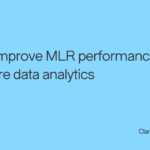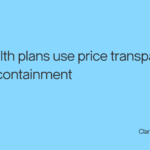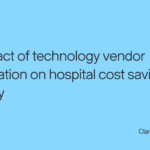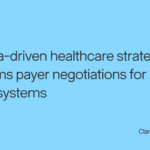For multi-hospital systems, payer negotiations are a high-stakes challenge. Complex reimbursement structures, payer demands for cost transparency, and the push for value-based care often leave health systems struggling to secure favorable outcomes. Without the correct data, these negotiations can feel like an uphill battle, leading to missed opportunities and weakened financial positions. The solution lies in adopting a data-driven strategy. Advanced analytics enable health systems to address these challenges head-on by uncovering reimbursement opportunities, ensuring cost clarity, and demonstrating measurable value-based care outcomes. Hospitals can confidently approach payer negotiations by leveraging actionable insights and market intelligence, providing more substantial outcomes and long-term financial success. Reimbursement rates are the foundation of any payer negotiation. While rates data is publicly available, it is often fragmented and disorganized, making it difficult for health systems to extract meaningful insights or effectively compare their rates to market benchmarks. This data chaos can obscure which service lines should be prioritized for renegotiation. This is where healthcare analytics platforms become invaluable. By consolidating and organizing this messy data, these platforms enable health systems to identify patterns, uncover discrepancies, and make data-driven decisions to optimize their payer contracts and improve negotiation outcomes. Data analytics platforms can analyze historical claims data to uncover reimbursement gaps and opportunities. For example, hospitals can identify discrepancies and prioritize high-impact service lines by benchmarking rates across markets. Predictive modeling also helps simulate the financial impact of proposed rate changes, ensuring every negotiation decision is backed by evidence. Payers expect hospitals to justify their rates with detailed cost data, yet many systems struggle to clarify their cost structures. It’s not just about knowing your numbers—it’s about presenting them in a way that builds trust and credibility. Advanced data analytics makes cost transparency achievable. Health systems can track service line expenses and profitability by implementing accurate cost accounting systems. Analytics tools further identify inefficiencies and cost drivers, providing the justification that payers demand. Over the past decade, patients receiving health care under Value-Based Care (VBC) arrangements grew by 2.3 million. As value-based care takes center stage, hospitals must show they’re not just delivering services—they’re providing outcomes. Payers want proof that patient care is improving while costs are being controlled. Without comprehensive data, this can be a tough ask. A data-driven healthcare strategy simplifies this process. By consolidating clinical and operational data, analytics platforms enable hospitals to track performance on key metrics like readmission rates, length of stay and patient satisfaction. Real-time dashboards provide a transparent, easy-to-understand view of these outcomes, building payer trust during negotiations. One of the most overlooked aspects of payer negotiations is understanding the broader market context, which includes not only payer strategies but also market share dynamics and regional health trends. Without a clear picture of how payers are positioned in the market and where they are focusing their efforts, hospitals risk entering negotiations without critical insights. Without a clear picture of payer strategies and regional health trends, hospitals risk going into negotiations blind. Market intelligence helps to address this. Advanced tools aggregate external data, offering insights into payer strategies, competitor performance, and regional dynamics. This empowers health systems to anticipate payer priorities and align their proposals accordingly. Hospitals can approach negotiations with payers with confidence and clarity. Payer negotiations remain a formidable challenge for multi-hospital systems, with complex reimbursement structures, demands for cost transparency, and rising expectations for value-based care outcomes. These challenges can lead to missed opportunities and weaker financial performance without the right tools. The key takeaway is clear: a data-driven healthcare strategy can transform the negotiation process. Advanced analytics empower health systems to optimize reimbursement rates by identifying gaps and prioritizing high-impact service lines such as Cardiology, Oncology, and Orthopedics. Robust cost transparency builds trust with payers, while value-based care metrics showcase measurable improvements in patient outcomes. Additionally, leveraging market intelligence provides a strategic edge, enabling systems to anticipate payer priorities and negotiate confidently. By embracing these tools and insights, health systems can shift from reactive to proactive, achieving more substantial negotiation outcomes, and setting the stage for sustained financial growth while ensuring the availability of much needed care. Optimizing reimbursement rates: The data-driven advantage
Strengthening cost transparency with a clear strategy
Demonstrating value-based care outcomes
Leveraging market intelligence for negotiation success
Turning challenges into opportunities with data-driven strategies
Provider: Health System Insights | December 23, 2024
How data-driven healthcare strategy transforms payer negotiations for multi-hospital systems
Reporting that’s committed to making healthcare insights accessible to all.

The complexity of healthcare data. Clarified.

Made for your most precise decision-making yet. Introducing the Clarify Atlas Platform®, our healthcare analytics platform and the foundation underpinning each of our building blocks. Atlas powers every decision with clarity brought from 20 billion data points and our best-in-class benchmarking technology.

Made for your most precise decision-making yet. Introducing the Clarify Atlas Platform®, our healthcare analytics platform and the foundation underpinning each of our building blocks. Atlas powers every decision with clarity brought from 20 billion data points and our best-in-class benchmarking technology.



